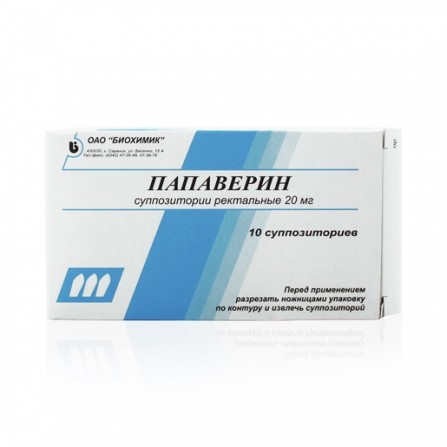Papaverine hydrochloride rectal suppositories 20mg N10
Condition: New product
997 Items
Rating:
Be the first to write a review!

More info
Active ingredients
Papaverine
Release form
Suppositories
Composition
Rectal suppositories 1 supp. papaverine hydrochloride 20 mg.
Pharmacological effect
Myotropic antispasmodic. Inhibits PDE, causes accumulation of cAMP in the cell and reduces the content of intracellular calcium. Reduces the tone of smooth muscles of internal organs (gastrointestinal tract, respiratory, urinary, reproductive system) and blood vessels. Causes dilation of arteries, contributes to increased blood flow, incl. cerebral It has a hypotensive effect. In high doses, reduces the excitability of the heart muscle and slows intracardiac conduction. When used in moderate therapeutic doses, the effect on the central nervous system is mild.
Pharmacokinetics
Bioavailability is 54%. Plasma protein binding - 90%. Well distributed in the body, penetrates through histohematogenous barriers. Metabolized in the liver. T1 / 2 - 0.5-2 hours. Perhaps an increase to 24 hours. Excreted by the kidneys as metabolites. Completely removed from the blood during dialysis.
Indications
Spasms of smooth muscles of the abdominal organs, bronchi, peripheral vessels, brain vessels, kidney angina (as part of combination therapy). As an aid to premedication.
Contraindications
AV-blockade, glaucoma, severe liver failure, old age (risk of hyperthermia), children up to 6 months, hypersensitivity to papaverine.
Use during pregnancy and lactation
During pregnancy and lactation (breastfeeding), the safety and efficacy of papaverine has not been established.
Dosage and administration
Inside - 40-60 mg 3-5 times / day. Rectal - 20-40 mg 2-3 times / day. With the / m, s / c, or in / in the introduction of a single dose for adults is 10-20 mg; the interval between injections is not less than 4 hours. For elderly patients, the initial single dose is not more than 10 mg. For children aged 1 to 12 years, the maximum single dose is 200-300 mcg / kg.
Side effects
Possible: nausea, constipation, drowsiness, excessive sweating, arterial hypotension, increased activity of hepatic transaminases. With rapid on / in the introduction, as well as when used in high doses: the development of AV-blockade, cardiac arrhythmias.
Interaction with other drugs
With simultaneous use with anticholinergic agents may increase the anticholinergic effects. It is believed that when used simultaneously with alprostadil for intracavernous administration, there is a risk of developing priapism. There are reports of a decrease in the effectiveness of levodopa with its simultaneous use. Reduces the hypotensive effect of methyldopa.
special instructions
Use with caution in conditions after traumatic brain injury, in case of chronic renal failure, in case of insufficiency of adrenal function, hypothyroidism, prostatic hyperplasia, supraventricular tachycardia, shock conditions. In / in should be entered slowly and under the supervision of a physician. During the period of treatment should be excluded alcohol.




